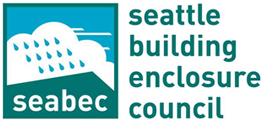|
2021 January Member Meeting
Thursday, January 21, 2021, 11:30 AM - 1:00 PM PDT
Category: 2021 Member Meetings
Passive House Wall Assembly Performance - A Case StudyImprovements in building efficiency can significantly reduce carbon emissions and are intrinsic components in greenhouse gas reduction targets. The Passive House concept provides a framework for high-performance buildings that is growing in popularity in Canada, and particularly in the Pacific Northwest. The Passive House standard requires its buildings to achieve specific performance values for heating energy use intensity, total energy use intensity, spatial temperature variation, heat recovery ventilation performance, and air leakage rate. The promised co-benefits of passive Houses include superior thermal comfort and indoor air quality. Passive House design is not prescriptive and can incorporate many different design aspects, the wall assembly is not an exception. This presentation will evaluate the hygrothermal performance of a deep-stud wall assembly of a Passive House in Victoria, BC, with regards to moisture durability. The concern with deep or double-stud wall assemblies is the combined effects of reduced drying with wall configurations that place moisture sensitive materials in riskier locations. Consequently, for this study, enclosure monitoring was undertaken in an occupied six-plex over the period of one year. Enclosure monitoring sensor packages were installed in strategic locations in the wall assembly to monitor the conditions of the assembly. The assemblies were evaluated based on the results of an empirical mold risk index. Air leakage is a significant concern of cavity insulated walls, but the air tightness requirements of Passive House minimize this risk. During this presentation, Robert Lepage and David Fox of RDH Building Science Inc. will provide a refresher of how walls behave from a hygrothermal perspective and how we can measure and assess a wall's performance. They will also discuss how deep stud high performance wall assemblies could have some issues.
This presentation is pending for 1 hour of AIA continuing education credits. Register here: https://us02web.zoom.us/webinar/register/9616074742557/WN_eNRxHA_MTs2bme03Z3YWAA Sponsored by: |

 Prev Month
Prev Month View Month
View Month Search
Search Go to Month
Go to Month Next Month
Next Month Robert Lepage is a Building Science Research Engineer for the Victoria BC, office of RDH Building Science Inc. (RDH). He has a strong theoretical background in hygrothermics and continuum mechanics. Rob specializes in research, forensic investigations, and climate change resilience. His work experience consists of a wide range of projects including vulnerability assessments, building enclosure condition assessments, forensic investigations, building monitoring, field review and laboratory and field testing. Rob is currently researching biological deterioration of building materials as part of his Ph.D., and is becoming an industry recognized specialist in biodeterioration and fungal growth.
Robert Lepage is a Building Science Research Engineer for the Victoria BC, office of RDH Building Science Inc. (RDH). He has a strong theoretical background in hygrothermics and continuum mechanics. Rob specializes in research, forensic investigations, and climate change resilience. His work experience consists of a wide range of projects including vulnerability assessments, building enclosure condition assessments, forensic investigations, building monitoring, field review and laboratory and field testing. Rob is currently researching biological deterioration of building materials as part of his Ph.D., and is becoming an industry recognized specialist in biodeterioration and fungal growth.  David Fox is an Associate and Senior Project Engineer for the Seattle, WA, RDH office. He works on a variety of projects including new construction, rehabilitation, investigations, and hygrothermal modeling. David's focus in the building enclosure field emphasizes thermal efficiency and durability to create sustainable buildings that exceed expectations. He focuses on new construction design projects while bringing his energy and sustainability experience to provide practical solutions to design challenges. Throughout his career, David has continued to expand his knowledge of building science, hygrothermal modeling, new construction consulting, and investigations.
David Fox is an Associate and Senior Project Engineer for the Seattle, WA, RDH office. He works on a variety of projects including new construction, rehabilitation, investigations, and hygrothermal modeling. David's focus in the building enclosure field emphasizes thermal efficiency and durability to create sustainable buildings that exceed expectations. He focuses on new construction design projects while bringing his energy and sustainability experience to provide practical solutions to design challenges. Throughout his career, David has continued to expand his knowledge of building science, hygrothermal modeling, new construction consulting, and investigations.  Export Event
Export Event 